Italy
Factsheet
| ETHNIC MINORITIES: | |
|
Roma: |
0.23% |
| RELIGIONS: | |
|
Roman Catholic: Muslim: |
90% 2.6% |
| NET MIGRATION: | 1,998,926 |
| POP. GROWTH RATE: | +0.3% |
| GDP GROWTH: | -1.6% |
| GDP PER CAPITA: | 33,072 |
| UNEMPLOYMENT: | 12.2% |
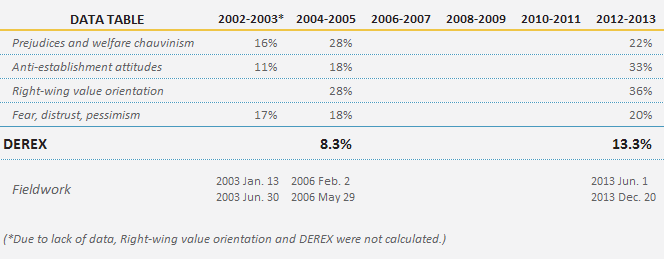
Northern League for the Independence of Padania (Lega Nord per l’Indipendenza della Padania, Lega Nord)
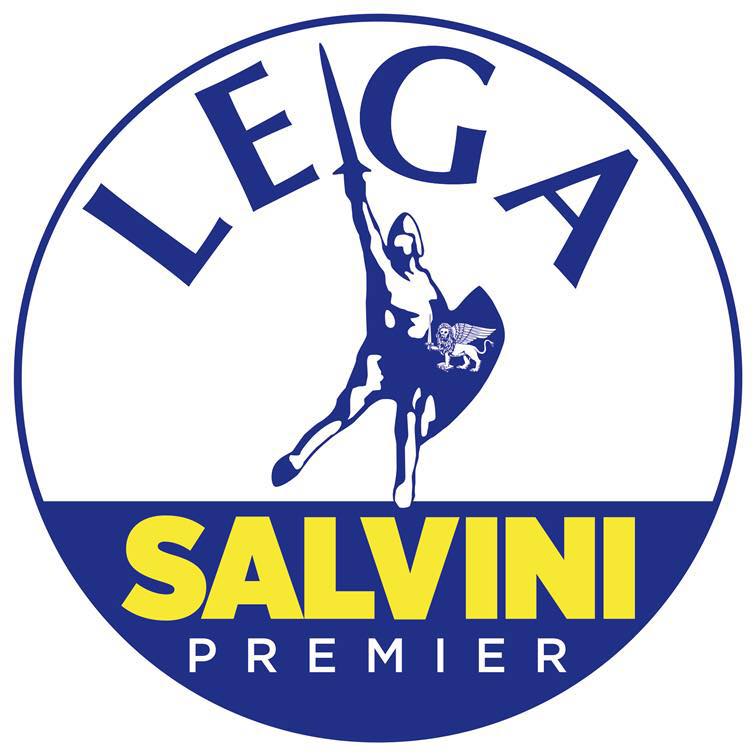
The Lega party, formally known as the Northern League for the Independence of Padania (Lega Nord per l’Indipendenza della Padania, or in short: “Lega Nord”), is a Italian populist radical far-right political party founded in 1991 as a federation of six regional parties of northern and north-central Italy, including Liga Veneta, Lega Lombarda, Piemont Autonomista, Uniun Ligure, Lega Emiliano-Romagnola and Alleanza Toscana, all of which became "national" sections. The party's founder was Umberto Bossi, and acted as federal secretary of the party from 1991 to 2012, however as a result of an internal struggle was ousted. Lega was briefly led by Roberto Maroni and, in 2013; Matteo Salvini defeated Bossi in a leadership election, subsequently becoming the party’s secretary. The party galvanized political support in the early 1990s through its vocal denunciation of corruption scandals in Rome. While Lega’s primary goal was the independence — or at least increased autonomy — of northern Italy, its single-issue regionalist agenda has expanded to include a broader array of political objectives. Specifically, the party has moved to the far-right of the political spectrum and now opposes abortion, same-sex marriage, stem cell research, euthanasia, immigration vaccinations, European integration and the mainstream Italian media and its journalists.
In the area of immigration, Lega is widely criticized in Italy for being racist and xenophobic, but it insists that these perceptions rest on a misunderstanding of its tough-on-crime policies. Salvini and the Lega party have often described migrants as criminals and has even gone to extreme lengths to block migrants from entering Italy, such as prohibiting sea vessels containing migrants from landing on Italian soil. The party has also passed a comprehensive set of laws on migration, which includes the prosecution of any persons caught assisting migrants attempting to enter.
Originally, with regards to the EU and EU integration, the partyheavily adhered to Eurosceptic positions, inserting in its program an option for leaving the Eurozone and going back to a pre-Maastricht situation. Although Lega rejects the “European super-state”, promotes an opening to Russia and advocates for a “Europe of the Regions,” the party has subsequently altered its stance slightly by articulating that it has no intention of leaving the EU, but wishes to improve it by returning sovereignty back to the member states. Generally speaking, the party leadership hopes this can be achieved if Salvini’s newly formed EU parliamentary group (Europe of People and Nation) becomes largest group in the EP. Salvini has attempted and almost succeeded at unifying the far-right leader within the EP, and hopes that his group will be strong enough to enact change specifically, decentralizing European decision-making, promoting nationalism and stopping the Brussels bureaucrats from burdening Italy any further. Salvini and the Lega have gone as far as to engage in a many disputes with the EU, the most notable was the budgetary one, which saw the Italian government propose a budget deficit of 2.4%, which would have exceeded the EU’s regulations.
With regards to European electoral performance, the party managed to achieve 10.2% of the vote share during the EP election in 2009. The subsequent election in 2014 proved the be an unsuccessful one as the party achieved a fairly lower vote share of 6.15% however, in the most recent 2019 EP elections, the party achieved the largest share of the vote of 34%, in what would be its best electoral performance ever. Switching to the national elections, in the 2013, the party came in 6th place with 4.1% of the votes however, during the last Italian elections in 2018 Legaearned 17.37 % of the votes, and found itself apart of the governing coalition in Italy, along with the 5 Star Movement (M5S).
(Last update on 26 June, 2019 by Stefano Gardiman)
Lega Nord on the Internet:

Tricolour Flame (Movimento Sociale Fiamma Tricolore, MS-FT)
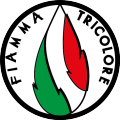
The party was founded in 1995 by departing members of a radical, fascist organization, known as the Fascist Italian Social Movement. The party was started by the more radical members of the Fascist Italian Social Movement, led by Pino Rauti, who refused to join the mainstream conservative party National Alliance. Until 2013, the party was led by Luca Romagnoli, after which point Attilio Carelli took over as secretary general. MS-FT ideology is characterized by a radical criticism of social, economic, cultural and political systems and their elites, and is guided by the ideology of the Fascist corporative state and nostalgia for its founder, Benito Mussolini. The party combines a traditional, right wing paternalistic philosophy with the Fascist state's ethnicity-based nation cult, laced with ostensibly socialistic, right-wing populist, anti-capitalist and social demagogy proclaiming the equality of all the peoples constituting the nation. On Italy’s far-right political spectrum the party stands closest to RSI (Italian Social Republic), although it is closely tied to the Italian Skinhead movement as well. MS-FT's two prominent members are: Pietro Puschiavo, founding member of the Veneto Skinhead Front established in 1985, and Maurizio Boccacci, the former leader of the Rome-based, far-right and skinhead-inspired Western Political Movement. The party also rejects the EU and calls for Italy's withdrawal from the euro zone. Instead of a Union dominated by technocrats and creditors, it advocates the establishment of a “Europe of Nations” and rejects serving US interests. In the 2004 EP elections, the party with a strong following particularly in the South gained enough votes to send its chairman to the European Parliament. However, in 2009, even as the organization's popularity grew from 0.7 to 0.8%, Romagnoli lost his seat in the EP. At the 2013 Italian general elections the party received 0.13% of the votes, whereas at at the 2018 Italian political elections was unimpressive, the party ran in a coalition with Forza Nuova (New Force) composing the list Italy to the Italians, which obtained around 0.38% of the votes.
(Last update on 26 June, 2019 by Stefano Gardiman)
MS-FT on the Internet:

Brothers of Italy (Fratelli d’Italia)
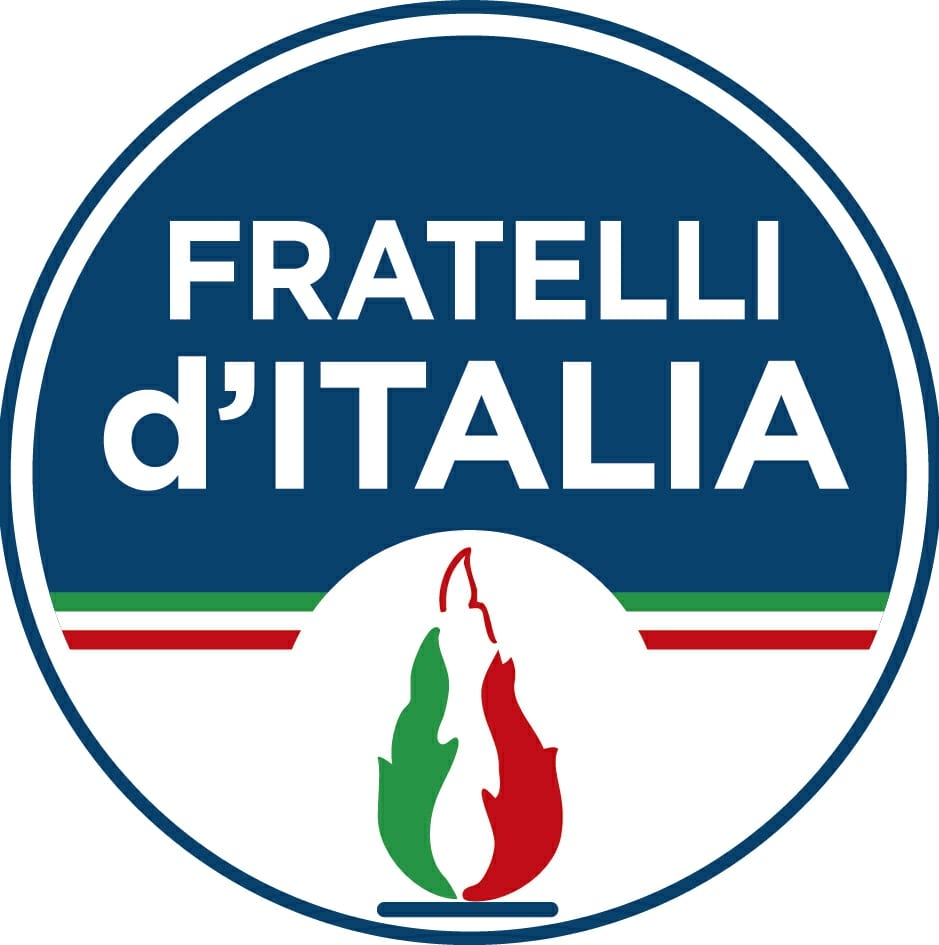
Brothers of Italy (Italian: Fratelli d'Italia, FdI) is a national-conservative political party in Italy led by Giorgia Meloni. The party, created from a split of The People of Freedom (PdL) in December 2012, is the main heir of the Italian post-fascist conservative tradition that had the Italian Social Movement (1946–1995) and National Alliance (1995–2009) as its main political representatives. National Alliance was merged into the PdL in 2009, but its bulk is now with the FdI. The FdI’s political positions are right-leaning in social matters and nationally conservative. The party's main ideological trends are Italian nationalism and conservatism, and its ideology includes also a Eurosceptic sentiment (mainly against the treaty of Lisbon. Leaving the Euro-zone, halting the implementation of ius soli, sustaining the laws criminalizing illegal immigration, and the increase of wages and equipment of the Italian Police forces, all rank amongst the party’s highest priorities. The party further expresses its Euroscepticism through its goals of reshaping EU treaties, and the insertion of a supremacy clause in the Italian constitution that would allow the country to block all agreements and directives it deems noxious for the state. FdI maintains its relations with the old nucleus of the Italian Social Movement (MSI) and is generally more linked to fascism than to the modern far-right. On the international level, FdI is politically similar to the Law and Justice party PiS in Poland and to the Front National in France. In the last national elections, which took place in 2018, the party gained 4.35% of the votes. In the most recent EP elections held in 2019, the part managed to secure 5 seats and roughly 6% of the vote share.
(Last update on 26 June, 2019 by Stefano Gardiman)
Fratelli d’Italia on the Internet:

Casa Pound (Casa Pound)
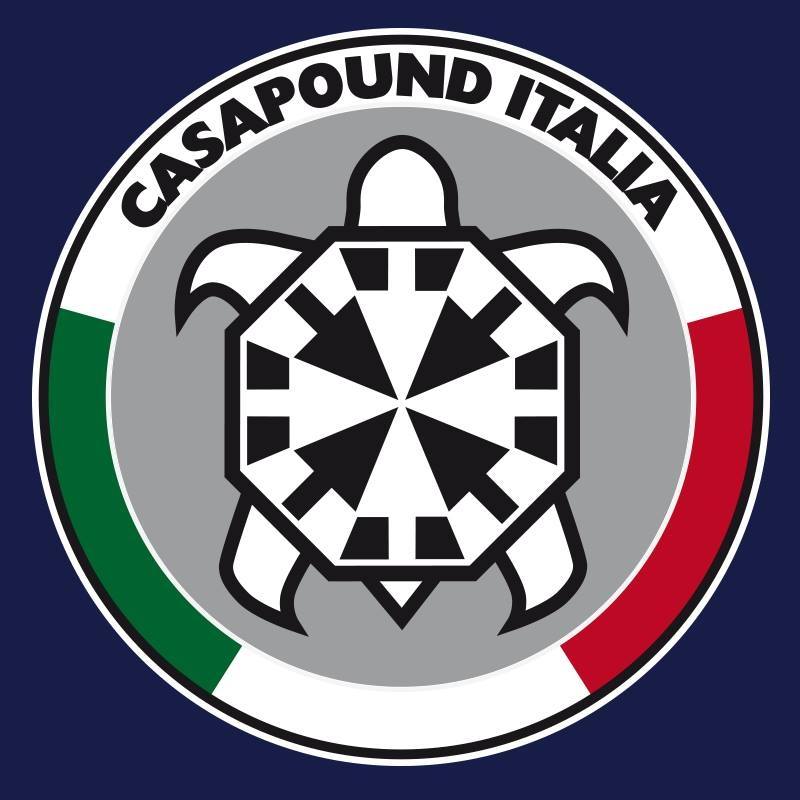
CasaPound Italy is a neo-fascist political party in Italy born as a network of far-right social centres arising from the occupation of a state-owned building by squatters in the neighbourhood of Esquilino in Rome on 26 December 2003. Subsequently, the phenomenon spread with other instances of squatting, demonstrations and various initiatives, becoming a political movement. As such, in June 2008, CasaPound therefore constituted an "association of social promotion", and assumed its current name CasaPound Italy – CPI; the party's symbol is the "Arrowed Turtle. CasaPound advocates for those who are marginalized by the current system, namely promoting the rights of young mothers, low-income families, and the unemployed. The group also pronounces a profoundly anti-immigration platform, claiming that migrants and refugees should be blocked before their arrival in Italy and repatriated. Euroscepticism is at the core of the party’s principles; accordingly, they argue for leaving the EU and NATO, the withdrawal from EU treaties as well as the nationalisation of the Italian economy and enterprises. They further call for the strengthening of foreign relations with Russia, Japan and Eastern European countries.
(Last update on 26 June, 2019 by Stefano Gardiman)
CasaPound on the Internet:

Forza Nuova (Forza Nuova)
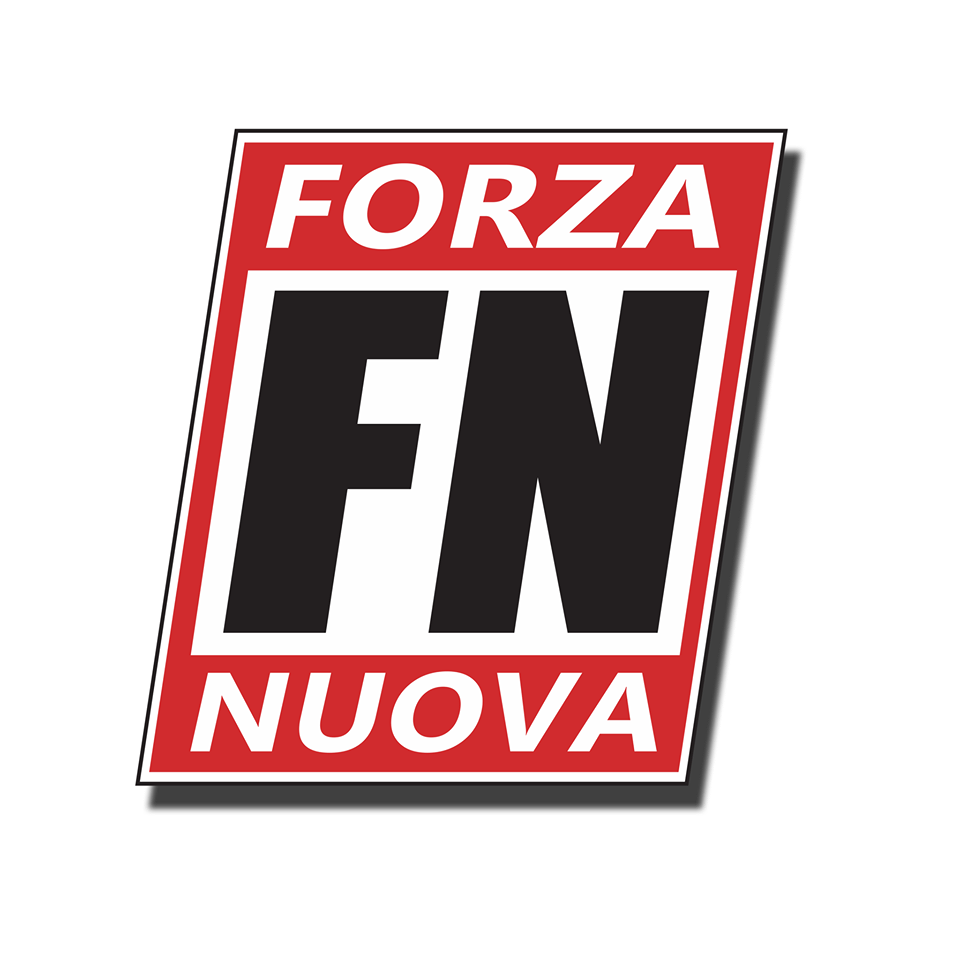
New Force (Forza Nuova, FN) is an Italian far-right political party founded by Roberto Fiore and Massimo Morsello in 1997. The party is a member of the Alliance for Peace and Freedom and was a part of the Social Alternative from 2003 to 2006. The party has often been strongly criticized for its radical positions and for acts of violence involving some militants. It was also the protagonist of political campaigns opposed to same-sex marriage and immigration to Italy. Despite Forza Nuova characterizing themselves as a post-ideological formation, the party can be rightly deemed a neo-fascist force that has been active in all Italian regions since 2008. FN is strongly Eurosceptic, nationalist and pro-nationalisation. Some of its members have been accused of racist and violent acts in Rome aimed against some exponents of the Bangladeshi community, while other members were accused of being Holocaust deniers and anti-Semites. In the 2018 elections they united with Tricolour Flame in the list Italia agli Italiani (Italy to the Italians) where they failed to win a single seat in the Italian legislature.
(Last update on 26 June, 2019 by Stefano Gardiman)
Forza Nuova on the Internet:
Parliamentary elections (Chamber of Deputies) - March 4, 2018
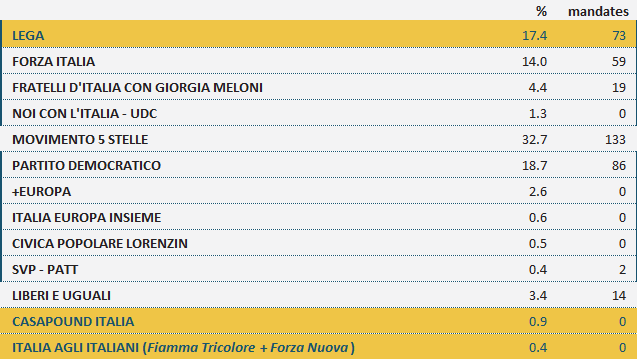

European elections - May 25, 2014


Parliamentary elections (Chamber of Deputies) - February 24, 2013
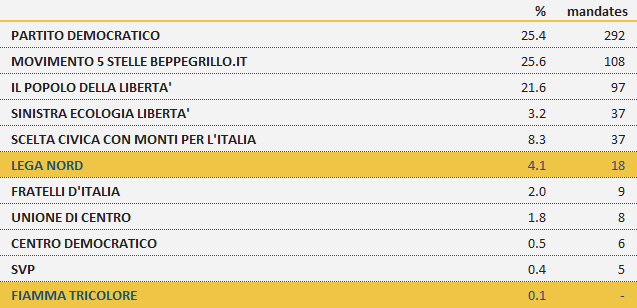

European Parliament elections - June 7, 2009


Parliamentary elections (Chamber of Deputies) - April 13, 2008
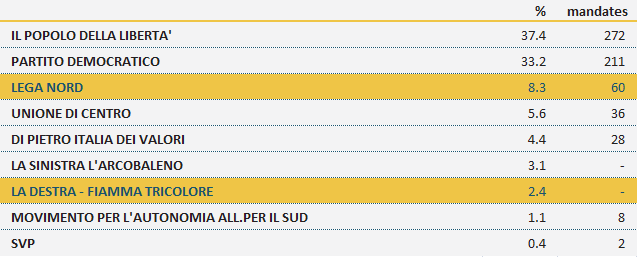

Parliamentary elections (Chamber of Deputies) - April 9, 2006
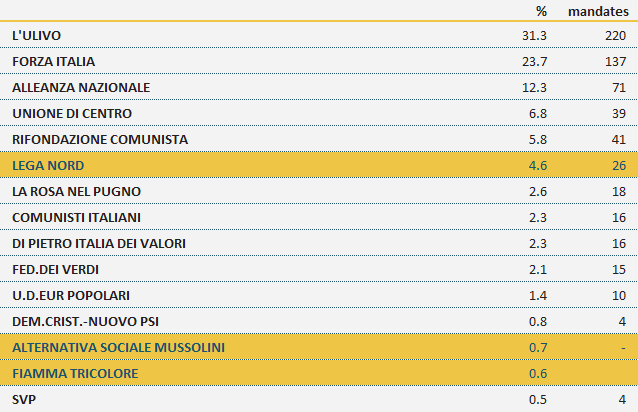
Source: 2018; Ministry of the Interior; EP2014
Our thematic websites
Political Capital's analyses and activities in English.
Research and advocacy programme focused on the role conspiracy theorising plays in shaping populist and radical politics.
Our project New electoral system in Hungary: watchdogging, advocacy and raising awareness focuses on the electoral reform in Hungary.
Our blog on political and societal extremism and conspiracy theories.
DEREX website is supported by










